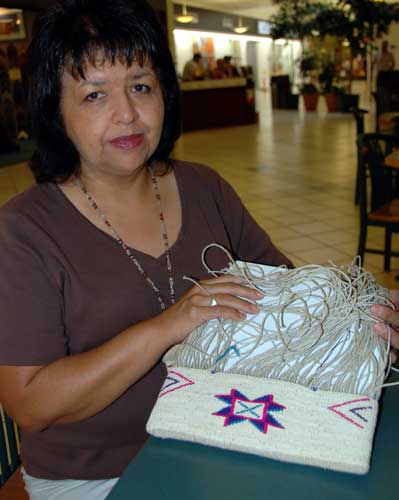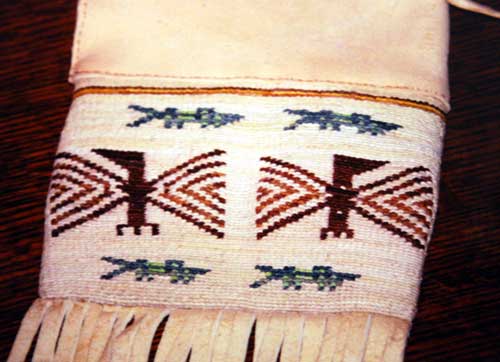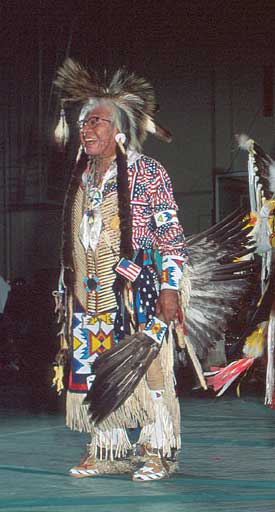
Jenny Williams and a bag in process.
Eight Annual Distinguished American Indian Speaker's Series

|
|
Jenny Williams and a bag in process. |
Keynote Presenter: Jenny Williams
Jenny Williams, Omaha/Nez Perce, was born and raised on the Nez Perce Reservation. Jenny is a self-taught weaver and has been weaving for more than fifteen years. She has studied with Master Weavers from around the Northwest.
In addition to cornhusk weaving, Ms. Williams enjoys weaving with pine needles, cedar bark, bear grass and other traditional grasses of the Plateau area. She, her husband, Dwight, and grandchildren spend the summer months gathering and preparing the natural materials for weaving. She has learned the art of gathering and processing Dog Bain (Hemp) twine, which was the traditional material used to weave cornhusk to create baskets, hats and bags for storing roots and berries.
Jenny has been a featured weaver at the Northwest Weaver's Conference and she was featured in the Smithsonian's National Museum of the American Indian Magazine (January 2003). One of her child's cornhusk hats is on display at the Museum. She has been commissioned to create numerous works of art. The designs she creates include the Plateau-style eight-pointed star, deer, moose, buffalo, sturgeon, condors, eagles, flowers and various geometric patterns.
Date, Times and Places: Jenny Williams will speak and give a weaving demonstration on her traditional art, the cornhusk weaving, on Wednesday October 3rd at two separate locations.
* At the Museum of Anthropology in College Hall on the Washington State University campus, Pullman, between 1:00 and 4:00 p.m.
* In Student Union Building Ballroom on the University of Idaho campus, Moscow, beginning at 7:00 p.m. Arthur Taylor, Native American Tribal Liaison to the Provost, will provide the welcome. Following Jenny's demonstration, she will be joined by Loretta Halfmoon, Scherri Greene, and Arthur Taylor, for a question and answer session.

|
|
Sturgeon and condor design, on a bag made of cornhusk on twine and edged in brain tanned, smoked buckskin. |
Cornhusk Weaving: A characteristic style of weaving throughout the Columbia River Plateau, cornhusk weaving is used to make hats, round bags, pouches, and flat twined bags. To prepare the fibers, the inner layers of the cornhusk are dried and torn into thin strips and used as the weaving material. It can take many weeks to complete a single bag. The weaving of cornhusk bags had almost disappeared by the middle of the twentieth century. But in an effort to preserve this art form and its associated cultural heritage the tradition has been revived by Indian weavers today. Consider the design, function and "heart" of one of Jenny's cornhusk bags. For two short video introductions to the art of weaving by Pat Courtney Gold (Wasco), go to Celebrating Arts and Basketry.
Sponsorship: This speaking engagement is being co-sponsored by the Northwest Native American Basketweavers Association, Plateau Center of Washington State University, and the American Indian Studies Program of the University of Idaho as the Eight Annual Distinguished American Indian Speaker's Series.
These sessions are free and open to the public
For more information, contact either Rodney Frey (U of I): (208) 885-6268 or e-mail: rfrey@uidaho.edu or Mary Collins (WSU) (509) 355-4314 or e-mail: collinsm@wsu.edu
for a U of I POSTER or a WSU POSTER
Plan to attend the:
13th Annual Native American Basketweavers Gathering
|
The Logo Basket for the Northwest Native American Basketweavers Association Klickitat style basket, woven by Nettie Jackson, Yakama |
Nez Perce Tribe Hosts, October 5, 6, 7, 2007
At the Clearwater River Resort & Events Center
17500 Nez Perce Road (4 miles east of Lewiston on Highway 95)
Lapwai, ID.
The Northwest Native American Basketweavers Association, (NNABA) and the Nez Perce Tribe invite you to come to our 13th Annual Gathering in October 2007. The purpose of this event is to allow true beginners and emerging Native American Weavers of all ages to come together to learn from 35 Master Weavers. Come and learn weaving techniques that begins on Friday; on Saturday a public forum will be held with demonstrations and panel discussions by the master weavers, the evening will conclude with a traditional banquet; and on Sunday, NNABA will conduct their general business meeting, and board of directors elections, all are welcome to attend.
Saturday's
(October 6) public forum event, held from 11:00 am to 4:30 pm, is free
and open to the public. Collectors, see and buy authentic
handmade baskets with Open Market, Demonstrations, Panels, Tours, and Much More.
View the full press release (click here)
For more information or registration, contact Ann McCormack (208) 843-7409 or e-mail: annm@nezperce.org
Volunteers Needed: NNABA is looking for volunteers to assist the Master Weavers on Friday and Saturday. Please contact Rodney Frey (208) 885-6268 or e-mail: rfrey@uidaho.edu

|
|
Horace Axtell, Nez Perce |
Tutxinmepu Pow-Wow
This annual event has been moved to Spring Semester.
Friday March 21 and Saturday March 22, 2008
in Memorial Gym on the University of Idaho, Moscow Campus
Sponsored by the Native American Student Association
The Annual Distinguished American Indian Speaker's Series is sponsored by the
American Indian Studies Program
The American Indian Studies Program at the University of Idaho is pleased to sponsor the Distinguished American Indian Speaker's Series. Begun in November of 2000 with the lecture by Rebecca Tsosie (Executive Director of the Indian Legal Program at Arizona State University), followed in 2001 with Duane Champagne (Director of the American Indian Studies Center at UCLA), and in 2003 with Devon Mihesuah (Professor of Applied Indigenous Studies at Northern Arizona University), the Series brings leading American Indian elders, scholars, artists, activists, and educators to campus for public lectures and workshops on topics of timely interest. The intention of the Series is to challenge widely held stereotypes and prejudices, and promote an appreciation of the continued vitality of American Indian cultures and traditions.
A Look Into the Past:
The 2000 - "Visions of Education for the 21st Century: Facing the Challenges of Cultural and Tribal Sovereignty" |
The 2001 - "Renewing Tribal Governments through Reconsidering Tribal Constitutions" |
The 2002 - "The Art of the Powwow: Creating a Sense of Place through Camera and Brush" |
The 2003 - "Indigenizing the Curriculum |
|
|
|
|
You are currently viewing: http://www.webpages.uidaho.edu/~rfrey/aistspeak.htm
Page manager: rfrey@uidaho.edu